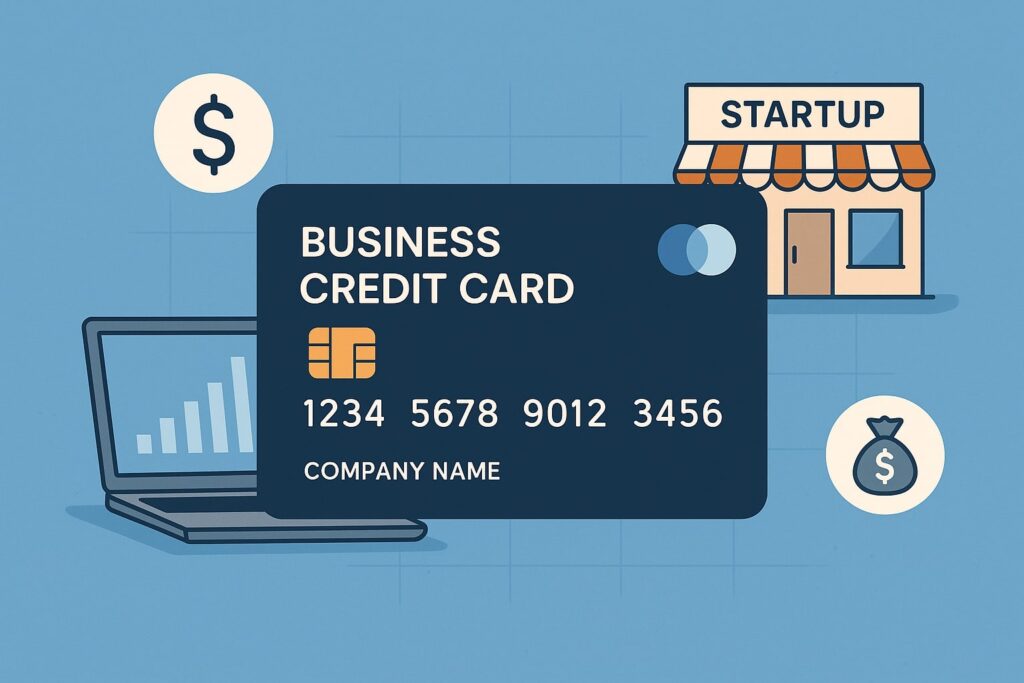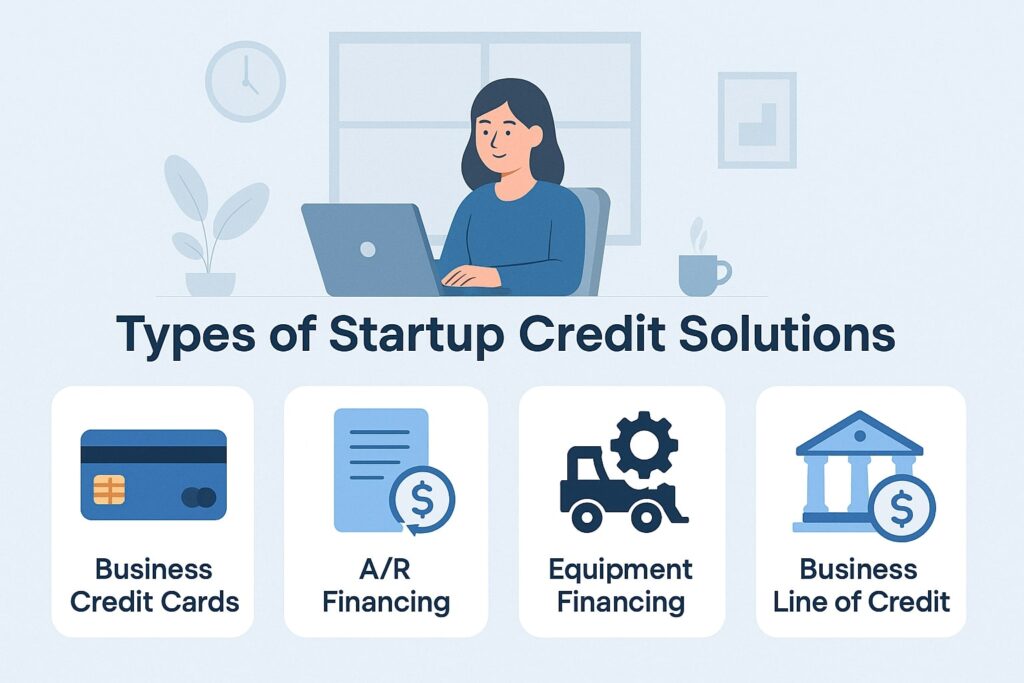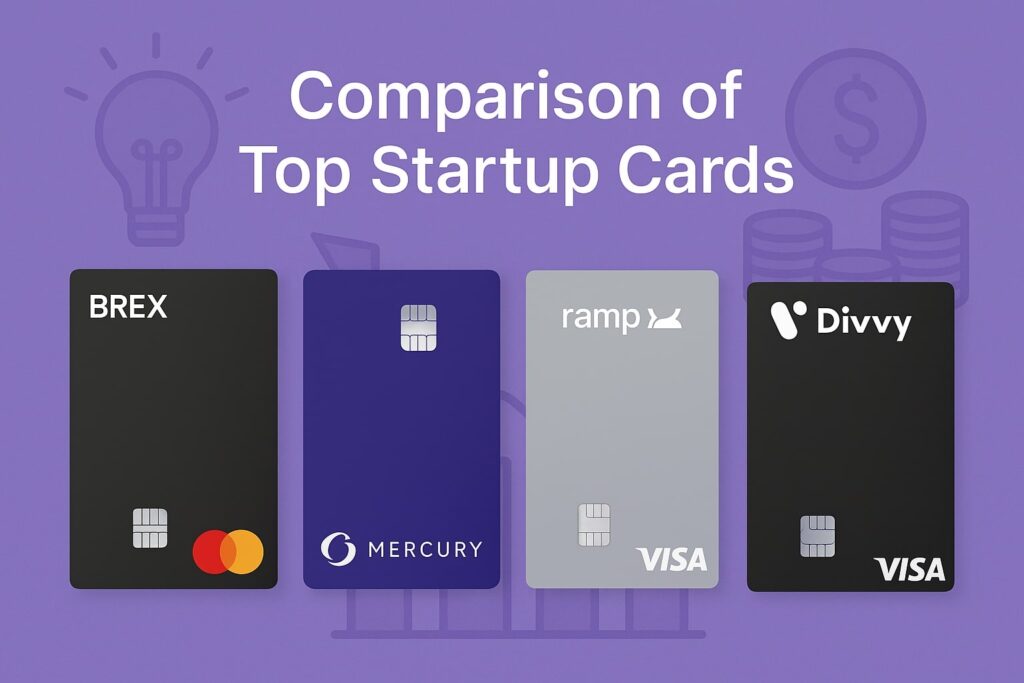
Top Business Credit Cards for Startups With No Credit History
Startups often face a Catch-22: they need credit to grow, but they have no credit history to qualify for traditional business cards. Fortunately, there are business credit cards for startups with no credit history that can help new companies manage expenses and build credit.
In the U.S., these options include corporate charge cards from fintech companies (like Brex, Ramp, Stripe, Divvy, Nav), secured business cards from major banks (like Bank of America or First National Bank of Omaha), and even flexible cards for fair personal credit.
This guide explores the top business credit cards for startups with no credit history, covering how they work, key features, and factors to consider when choosing one. We also include secured and charge card options.
Throughout, we highlight ways to build your business credit profile without jeopardizing personal credit, so you can get your startup off the ground with the right financial tools.
Why Business Credit Cards Matter for Startups

New business owners can gain many advantages by using a dedicated business credit card, even when they have no credit history. A business credit card helps separate business and personal expenses, which simplifies bookkeeping and protects personal assets.
Keeping finances separate is crucial for sole proprietorships and even more so for LLCs or corporations, because commingling funds can undermine the liability protections of your business entity.
A business credit card can also help manage cash flow during early growth. Startups often face unpredictable expenses and slow payments, so having a financial cushion can cover short-term needs without tapping personal funds.
Many cards provide a spending limit that gives startups flexibility to handle inventory purchases, marketing costs, travel, or equipment, which can be especially helpful when traditional loans are hard to obtain as a new company.
Another key benefit is building business credit. When a startup uses a card responsibly (making purchases and paying on time), those on-time payments get reported to commercial credit bureaus.
Over time, this builds a business credit history, which makes it easier to qualify for larger loans and credit lines later. Some business credit cards specifically report to business bureaus, helping separate your company’s credit profile from your personal credit.
Finally, many business cards offer rewards and cashback on purchases (travel perks, cashback on supplies, etc.) that can effectively reduce costs. Of course, startups must pay balances in full to avoid interest, but when managed well, rewards become “free money” to reinvest in the business.
Challenges for Startups With No Credit History

The main challenge for a startup with no credit history is approval odds. Most traditional bank cards require at least good personal credit (often a FICO score ~680+) and may check personal credit when you apply.
If your credit profile is thin or non-existent, those cards will likely be declined. That’s why the cards covered here use alternative underwriting: some look at business revenue and cash flow, others require a refundable deposit instead of credit, and some are prepaid or charge cards that don’t allow carrying a balance.
Another issue is that many specialized startup cards are charge cards rather than revolving credit cards. Charge cards require you to pay the full balance each month (no carrying a balance).
While this avoids interest, it means you must manage cash flow carefully. For example, Ramp’s and Nav’s cards must be paid daily or monthly in full.
Fees can also differ. Some no-credit cards have no annual fee (common with corporate charge cards and secured cards), while others may charge monthly membership (Nav Prime) or annual fees (some secured cards).
Rewards vary too: many corporate/no-credit-check cards simply offer flat cashback, and secured cards often have modest rewards. Low or no fees and solid credit-building should often take priority over perks for a startup just establishing credit.
Types of Startup Credit Solutions

Charge Cards and Corporate Cards (No Credit Check)
Several fintech “corporate” cards are designed specifically for startups with no or limited credit. These charge cards don’t run a personal credit check; instead they assess your business finances.
For example, the Ramp Business Card requires only an Employer ID Number (EIN) and about $25,000 in business bank deposits. It grants a dynamic spending limit based on company revenue, and all balances must be paid in full each month.
Likewise, the BILL Divvy Corporate Card underwrites based on business account balances (typically $20,000+ required) and a soft business credit review. Divvy provides both physical and virtual cards with real-time expense tracking and spend controls.
Some corporate cards require joining a specific platform. The Nav Prime Card is available with a $49.99/mo Nav Prime membership. It has no credit or deposit requirement at application time and reports to business credit bureaus.
The card connects to your checking account and uses automatic daily repayment. Although Nav Prime has no rewards, its sole focus is building your business credit profile without affecting personal credit.
Other notable charge-card options include Stripe Corporate Card, which is invite-only for startups using Stripe. It has no fees or credit check; approval is based on your Stripe account’s revenue history.
It earns unlimited 1.5% cashback applied to your Stripe balance. All of these charge cards typically do not allow carrying balances (no interest charges), making them lean tools for managing spend while you grow the business credit profile.
Secured Business Credit Cards
A secured business credit card requires a cash deposit that becomes your credit limit. This deposit reduces risk for the issuer, allowing approval regardless of your credit score. For startups, secured cards are a proven way to start building credit.
- Bank of America Business Advantage Secured Cash Rewards Mastercard: Requires a minimum $1,000 deposit (your credit line). It earns an unlimited 1.5% cash back on purchases and has no annual fee. (It does charge a 3% foreign transaction fee.)
BofA will periodically review your account, and responsible use can lead to upgrading to an unsecured BofA business card. Payments to this card can help strengthen both your business credit and personal credit (as BofA reports to the Small Business Financial Exchange). - FNBO (First National Bank of Omaha) Business Edition® Secured Mastercard®: Allows a credit limit from $2,000 up to $100,000, in increments of $50. You must deposit 110% of your desired limit (e.g. deposit $2,200 for a $2,000 limit).
The deposit accrues interest. This card has no rewards but offers perks like automatic rebates (Mastercard Easy Savings) and business discounts (e.g. QuickBooks). It charges a $39 annual fee. - Valley Secured Business Visa: (From Valley National Bank) – Another bank-issued secured card where the credit limit equals your deposit. It reports to business credit bureaus and offers 1% cashback rewards.
It has no annual fee but does require a 110% deposit and initial branch visit. (Applying online is not available; typically one must apply in person.) - OpenSky® Secured Visa® Card: Although not branded as a business card, it’s a secured Visa that doesn’t require a credit or bank check. You choose a deposit between $200–$3,000 (the deposit = credit limit).
It has a $35 annual fee and high APR (around 24.64%). Importantly, it reports to all three major bureaus, helping build credit if you pay on time. It has no rewards, but after about six months of good payment history you can often upgrade to an unsecured card.
Startups can use this card personally (with business expenses) as a last resort credit-builder when no other options are available.
Traditional Business Credit Cards for Limited Credit
Even with no business credit history, some traditional business cards are still accessible if the founder has fair personal credit or can provide strong documentation. These usually require a personal guarantee, so the issuer will look at your personal FICO score, but they often accept lower credit tiers than premium cards.
- Capital One Spark Classic for Business – Designed for entrepreneurs with fair or limited credit. It does require a personal credit check, but it is aimed at applicants without established business credit.
It offers unlimited 1% cash back on all purchases, no annual fee, and no foreign transaction fee. It comes with a fair APR (~30%) and does not offer bonus spending. Still, it’s a practical starter card: no annual fee and it helps build credit if used responsibly.
Rippling and Ramp both note that the Spark Classic is a solid starter, especially because it reports to business credit bureaus. - Chase Ink Business Unlimited/Preferred – These cards offer high rewards but require excellent personal credit (Chase does not consider them “no credit check” cards). They carry no annual fee (Unlimited) or a modest fee (Preferred) and earn 1.5%-3x points.
While not aimed at zero-credit startups, they are worth mentioning as aspirational cards once a business builds some credit history. - American Express Blue Business Cash/Blue Business Plus – AmEx cards require solid personal credit but have no annual fee and earn cash back or points.
They can be useful after initial credit is established, but they are not typically available to startups with no credit. (However, Blue Business Cash requires good credit and offers 2% cash back up to $50K per year.) Use them as future goals rather than immediate solutions.
Alternative Corporate and Prepaid Cards
- Emburse (formerly Certify/CORP) – Emburse offers expense management solutions with flexible card options. They provide both prepaid cards (which don’t require a credit check and are funded by your account) and credit card accounts for businesses that qualify.
The prepaid cards can work like debit cards for employees but with the Emburse reporting features. If your business signs up for Emburse’s expense software, you can issue cards to employees without a personal credit check.
Emburse’s cards offer unlimited cashback and strong accounting integration. This is more of a corporate expense solution than a typical credit-building card, but it’s useful for startups to control employee spending. - Corporate Card Programs (e.g. Brex) – Brex is a well-known corporate card for startups and does not require a personal guarantee or credit check.
Instead, Brex evaluates your company’s finances (bank statements, VC funding, etc.) to set a credit limit. It offers high rewards (up to 7x points on popular startup categories) and no annual fee.
While Brex often works with tech startups with funding, its model (no personal credit pull, high limits based on cash) exemplifies how fintechs are changing access for new businesses. (Brex’s official site notes it doesn’t require personal credit or guarantee.) - Vendor Net-30 Accounts – Not a credit card, but worth mentioning. Many suppliers (Uline, Quill, Alibaba, Summa Office Supplies, etc.) offer Net-30 terms: buy supplies now and pay the invoice in 30 days without interest.
Using these responsibly can also build business credit if the vendor reports to a bureau. It’s a good supplemental funding source if you need inventory or equipment and your credit cards won’t cut it yet.
Comparison of Top Startup Cards

The following table summarizes key features of several standout cards for new businesses without credit history:
| Card (Issuer) | Type / Credit Check | Requires Personal Guarantee? | Fees | Rewards | Key Requirements |
|---|---|---|---|---|---|
| Ramp Business Card (Ramp) | Charge card – no personal credit check | No | $0, no foreign fees | Unlimited 1.5% cashback on all spend | EIN, ~$25K in business deposits required |
| BILL Divvy Corporate Card (Divvy) | Charge card – soft business credit check | No | $0 | 1.5%–5%+ rewards (tiers by spending category) | Typically ≥$20K in business bank balance; LLC/Corp status |
| Stripe Corporate Card (Stripe) | Charge card – no personal check | No | $0, no FX fee | Unlimited 1.5% cashback (applied to Stripe balance) | Must be a Stripe merchant account with history |
| Nav Prime Card (Nav) | Charge card – no credit check or deposit | No | $49.99/mo (Nav Prime membership fee) | None (focus on credit building) | Must enroll in Nav Prime; EIN required; daily autopay |
| Capital One Spark Classic for Business | Unsecured credit – personal fair credit check | Yes | $0 | 1% cashback on purchases | Fair credit (no business credit needed); EIN, SSN |
| Chase Ink Business Unlimited | Unsecured credit – requires excellent credit | Yes | $0 | 1.5% cashback; ~$750 sign-up bonus | Excellent personal credit; EIN, SSN |
| Emburse Corporate Card (prepaid) | Prepaid business card – no credit check | N/A | Varies with plan; no personal credit needed | Unlimited cashback on spend (varies by plan) | Must have Emburse account (paid expense software) |
| Bank of America Secured Cash Rewards | Secured credit | Yes | $0 | 1.5% unlimited cashback | Deposit ≥$1,000 (equals credit limit) |
| FNBO Business Edition Secured | Secured credit | Yes | $39 | None (interest on deposit) | Deposit 110% of desired limit |
| OpenSky Secured Visa | Secured credit | No personal credit check | $35 | None (reports to bureaus) | Deposit $200–$3,000 (sets limit) |
| Valley Visa Secured | Secured credit | N/A | $0 | 1% cashback | Deposit 110%; apply in person |
Each of these cards works differently. Corporate charge cards (Ramp, Divvy, Stripe, Nav) require you pay the balance each cycle but make access easier with only business-based underwriting. Secured cards require deposits but give you traditional credit lines.
Traditional credit cards like Spark Classic need personal credit history. Choose based on your business structure, financing needs, and how quickly you can repay.
Factors to Consider When Choosing a Startup Card
When selecting a credit solution, keep these points in mind:
- Approval Requirements: Understand what the issuer evaluates. Cards like Ramp or Nav focus on business revenue and balances, while secured cards rely on your deposit. Make sure you meet any minimum balance or revenue thresholds, and have an EIN if required.
Remember most standard cards will check personal credit (usually needing a score ~680+). Only a few options truly ignore credit scores (e.g. charge cards above, secured cards, prepaid cards). - Personal Guarantee and Credit Checks: Many business cards require a personal guarantee, meaning the issuer will pull your personal credit report.
If you want to keep business debt off your personal credit, look for no-credit-check cards like Brex or Ramp (which have no personal guarantee) or secured cards (which don’t need credit checks but do report to bureaus). - Repayment Terms: No-credit-check cards (Ramp, Divvy, Stripe, Nav) usually require full payment daily or monthly. This can protect you from interest, but ensure your cash flow can cover it.
If you need to carry a balance occasionally, a secured or traditional card with an introductory 0% APR might work better (e.g. Chase Ink Unlimited offers 12 months 0% APR). - Rewards and Fees: Startups should weigh costs vs. benefits. Many startup-friendly cards charge no annual fee (Ramp, Divvy, Spark Classic, etc.), which is ideal. Check for any hidden fees (nav Prime card has a monthly fee, OpenSky has an annual fee, foreign transactions).
If cash back or rewards matter, look at the rate: Ramp and Capital on Tap offer 1.5% back on all spend, Spark Classic 1%, Divvy 1.5%–5% on select categories, etc. Rewards won’t be stellar compared to premium cards, but even 1–1.5% back is useful. - Credit Building: If building business credit is your goal, confirm the card reports to commercial bureaus (Dun & Bradstreet, Experian Business, Equifax Business). Most of the cards here do report.
For instance, Nav Prime explicitly reports to business bureaus, and secured cards like BoA Secured report payment history. Using any card responsibly (even personal business card) will help grow your credit file.
Tips to Improve Approval Odds
- Open a Business Checking Account: Having a dedicated business bank account signals legitimacy. Many startup cards that don’t use credit checks will require you to link a business bank account (Ramp, Nav Prime, Stripe, etc.).
This allows them to assess cash flow. Maintain a healthy balance and make routine deposits to look strong on paper. - Register Your Business: Forming an LLC or corporation, and obtaining an EIN from the IRS, can boost credibility. Some charge cards explicitly require a registered business entity (not sole proprietors).
Even if you operate informally, filing for an EIN and business registration can help when applying for cards that want that information. - Gather Financial Documentation: Be ready to show recent bank statements, revenue records, or sales platform history (like Stripe, PayPal, etc.).
Cards like Ramp and Stripe will use connected account history to make decisions. If you can prove steady deposits or sales, that can offset the lack of credit. - Start Small and Build Up: Even with these special cards, early credit limits may be modest. Use the card for essential purchases and pay in full to build a positive history.
After 6–12 months of on-time payments, you can often get a credit limit increase or qualify for unsecured products. Some issuers (like Bank of America) may convert a secured card to unsecured once you prove reliability. - Use Alternative Financing Wisely: If a credit card isn’t an option yet, consider vendor net terms, microloans, or even personal credit lines (cautiously).
But always keep building your business credit profile with whatever you use, and avoid overextending personally.
Frequently Asked Questions
Q: Do I need a personal guarantee or good personal credit?
Answer: Most business credit cards do require a personal guarantee, meaning the issuer will check personal credit. However, some fintech corporate cards (Brex, Ramp, Nav Prime, Stripe, Divvy) offer no personal guarantee and no credit check.
For secured cards, no credit check is needed (only your deposit). If you have fair credit (FICO ~620–670), cards like the Capital One Spark Classic are accessible.
Q: Do I need an EIN (Employer Identification Number) to apply?
Answer: Most startup business credit cards will ask for an EIN and business details, but it’s not always mandatory. Cards that focus on business data often require an EIN (Ramp, Nav Prime, Stripe).
However, even some that allow sole proprietors still request an EIN to build credit profiles. It’s a good idea to obtain an EIN – it’s free from the IRS – and use that when applying.
Q: Does applying for a startup card hurt my personal credit?
Answer: If the card requires a personal guarantee, a hard inquiry might appear on your personal report at the time of application. Cards with no credit check (e.g. Ramp, Nav Prime, Stripe, OpenSky) won’t add an inquiry.
Regardless, once approved, business card usage generally does not affect your personal credit score as long as payments are on time. (Late payments could go on your personal report if you personally guarantee.) And with no-credit-check cards, your personal credit remains untouched entirely.
Q: Can I get employee cards or additional user cards?
Answer: Yes. Most business cards allow you to issue cards to employees or team members. For example, Ramp and Divvy let you create unlimited virtual or physical employee cards with individual spend limits.
Secured cards like FNBO also allow additional users (it’s best to check terms). Remember, as the business owner you’re ultimately responsible for all charges, so set clear spend policies and oversight.
Q: How long until my business builds credit?
Answer: Building a credit file takes time. You’ll typically need to have an active Tradeline (like a credit card or loan) reported to the business credit bureaus. With responsible use (on-time payments, keeping balances low), you might start seeing a history after 1–2 billing cycles.
A strong profile usually takes 6–12 months or more of activity. Patience and consistency are key. Check business credit reports periodically (some services give limited reports for free) to track your progress.
Q: Are there any business cards I should avoid?
Answer: Be cautious with any card that charges high fees or interest without offering commensurate benefit. Avoid cards that require interest accrual if you don’t plan to carry a balance.
Also, some cards marketed as “business” may only report to personal credit bureaus, which won’t help your business credit. Focus on cards that report to business bureaus.
Finally, watch out for scams or predatory lenders promising easy money; always go through reputable banks or well-known fintechs.
Conclusion
For startups in the United States with no established credit, several card options exist beyond traditional bank cards. Corporate charge cards from fintechs like Ramp, Brex, Stripe, Divvy and Nav Prime allow you to access credit based on business performance rather than personal history.
Secured business credit cards from banks (Bank of America, FNBO, etc.) offer a stepping stone by using your deposit as collateral.
Even small-business versions of popular cards (Capital One Spark Classic) can help if you have only fair personal credit. The best choice depends on your business structure, cash flow, and how soon you can repay.
Whichever route you choose, use the card wisely: pay on time, keep balances low, and separate business expenses from personal. This not only leverages the immediate benefits (like managing cash flow and earning rewards) but also lays the groundwork for a solid business credit history.
Over time, that creditworthiness will unlock better financing and tools as your startup grows. By carefully evaluating your options and following best practices, even a new business with no credit history can find a suitable card to build its financial foundation.